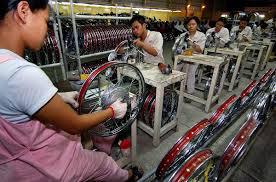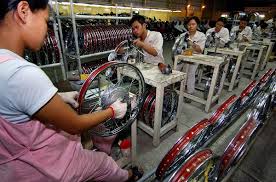
Problems for the Chinese economy do not seem to be getting over.
The second largest economy of the world recorded a two year low manufacturing index as was found out in a survey, made public on Monday. The survey suggests that the the Chinese economy is facing downward pressure in the third quarter.
Shanghai News group indicated that the final reading of Caixin's Purchasing Managers' Index (PMI) came in at 47.8 for the month of July. This is a key gauge of the Chinese manufacturing activity which plunged to a two-year low. The media group conducted survey jointly with Markit, a financial information services provider that compiled the survey.
This figure in recorded in June was down by almost a point than it had recorder a month age. The index had registered 49.4 in June and had the weakest reading since it registered 47.7 in July 2013, according to previous data.
The Caixin's Purchasing Managers' Index is seen as a key barometer of China’s economic health tracks activity in factories and workshops.
According to economists, the economy is said to be doing well and recording growth when the index registers above 50 signals while anything below indicates contraction in the manufacturing sector.
“July data signalled that the downturn in China’s manufacturing sector intensified at the start of the third quarter while the renewed falls in both total new work and new export orders led manufacturers to cut production at the fastest rate since November 2011,” Caixin and Markit said in the press release.
Bloomberg News had predicted a median of 48.3 in a survey and the most recent survey data indicates that the Chinese manufacturing sector missed that mark predicted by Bloomberg News. China had announced on Saturday that according to the National Bureau of Statistics, the country’s official PMI slowed further in July, decelerating to 50.0 from 50.2 in June.
Earlier the sponsorship of the PMI survey was done by British banking giant HSBC till June this year and Caixin took over sponsorship from the British banking giant from July.
Economists say that a weaker Caixin PMI coupled with a lower official PMI is indicative of the slackening growth of the Chinese economy.
The survey results could have a significant impact on the overall growth figures for the Chinese economy which, calculated on a year-on-year basis and considering the industrial production growth for last month may come in lower than their current estimate of 6.8 percent.
It may be noted that the industrial output expanded by 6.8 percent in June when compared to the growth a month earlier.
The drop in the July PMI results is seen as a fall out of the bad weather according to Julian Evans-Pritchard, China economist at Capital Economics.
A number of tropical storms had hot the country in the last month and the weak readings are reflective of the temporary disruptions to factory activity as a result of the storms, Pritchard said in a report.
It is noteworthy that a large number of the export oriented factories in China are located primarily in the coastal areas in the south and east of the country and hence are significantly vulnerable to adverse weather especially during the summer storm season.
China’s economy has already diverted from its path of phenomenal growth as the country’s economy expanded 7.4 percent in 2014 which was the lowest growth figure for the economy since 1990. The economic growth has slowed down further in the first two quarters of this fiscal to clock 7.0 percent.
The Chinese market authorities have been trying hard to bring the economy back on track as the central bank has already cut interest rates four times since November and has continuously eased lending rules for banks in aggressive measures to spur industrial spending. However despite these measures, there has been a continuous cut in production by the manufacturers and the month of July has seen the fastest rate of contraction since November 2011.
(Source: www.bbc.co.in, www.forbes.com & AFP)
The second largest economy of the world recorded a two year low manufacturing index as was found out in a survey, made public on Monday. The survey suggests that the the Chinese economy is facing downward pressure in the third quarter.
Shanghai News group indicated that the final reading of Caixin's Purchasing Managers' Index (PMI) came in at 47.8 for the month of July. This is a key gauge of the Chinese manufacturing activity which plunged to a two-year low. The media group conducted survey jointly with Markit, a financial information services provider that compiled the survey.
This figure in recorded in June was down by almost a point than it had recorder a month age. The index had registered 49.4 in June and had the weakest reading since it registered 47.7 in July 2013, according to previous data.
The Caixin's Purchasing Managers' Index is seen as a key barometer of China’s economic health tracks activity in factories and workshops.
According to economists, the economy is said to be doing well and recording growth when the index registers above 50 signals while anything below indicates contraction in the manufacturing sector.
“July data signalled that the downturn in China’s manufacturing sector intensified at the start of the third quarter while the renewed falls in both total new work and new export orders led manufacturers to cut production at the fastest rate since November 2011,” Caixin and Markit said in the press release.
Bloomberg News had predicted a median of 48.3 in a survey and the most recent survey data indicates that the Chinese manufacturing sector missed that mark predicted by Bloomberg News. China had announced on Saturday that according to the National Bureau of Statistics, the country’s official PMI slowed further in July, decelerating to 50.0 from 50.2 in June.
Earlier the sponsorship of the PMI survey was done by British banking giant HSBC till June this year and Caixin took over sponsorship from the British banking giant from July.
Economists say that a weaker Caixin PMI coupled with a lower official PMI is indicative of the slackening growth of the Chinese economy.
The survey results could have a significant impact on the overall growth figures for the Chinese economy which, calculated on a year-on-year basis and considering the industrial production growth for last month may come in lower than their current estimate of 6.8 percent.
It may be noted that the industrial output expanded by 6.8 percent in June when compared to the growth a month earlier.
The drop in the July PMI results is seen as a fall out of the bad weather according to Julian Evans-Pritchard, China economist at Capital Economics.
A number of tropical storms had hot the country in the last month and the weak readings are reflective of the temporary disruptions to factory activity as a result of the storms, Pritchard said in a report.
It is noteworthy that a large number of the export oriented factories in China are located primarily in the coastal areas in the south and east of the country and hence are significantly vulnerable to adverse weather especially during the summer storm season.
China’s economy has already diverted from its path of phenomenal growth as the country’s economy expanded 7.4 percent in 2014 which was the lowest growth figure for the economy since 1990. The economic growth has slowed down further in the first two quarters of this fiscal to clock 7.0 percent.
The Chinese market authorities have been trying hard to bring the economy back on track as the central bank has already cut interest rates four times since November and has continuously eased lending rules for banks in aggressive measures to spur industrial spending. However despite these measures, there has been a continuous cut in production by the manufacturers and the month of July has seen the fastest rate of contraction since November 2011.
(Source: www.bbc.co.in, www.forbes.com & AFP)





